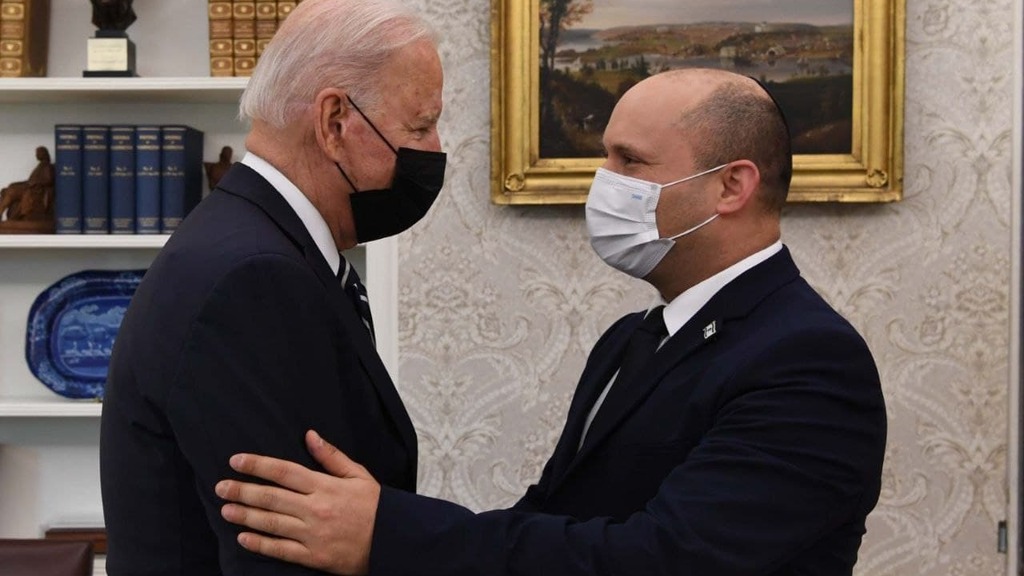The United States on Tuesday voiced its strong opposition to Israel's plans to advance construction of thousands of housing units in its West Bank settlements. The U.S. State Department called the move "inconsistent with efforts to lower tensions and were damaging to the prospects of a two-state solution."
The administration of U.S. President Joe Biden also asked for clarifications over the Defense Ministry's designation of six Palestinian civil society organizations as facilitators of terrorism.
These two developments beg the question: Is the honeymoon period between the administrations of Biden and Bennett now over?
Meanwhile, Israel dispatched representatives of the Foreign Ministry and the Shin Bet security Agency to Washington, to provide administration officials with the intelligence that prompted the Defense Ministry's decision to terror tag the Palestinian rights groups.
The government claims the organizations were affiliates of the Popular Front for the Liberation of Palestine, a terror group responsible for violent attacks against Israelis, and that the groups were used to launder funds to finance PFLP's activity.
After Gantz announced his decision on Friday, State Department Spokesperson Ned Price claimed the U.S. had not been informed in advance of the move, a claim disputed by local officials who said the information was relayed to security officials from the Shin Bet and the Foreign Ministry.
Ministry officials expected a backlash over the designation, predominantly from European nations who fund the Palestinian groups annually, but not from the U.S.
3 View gallery


EU representatives meet with Palestinian organizations designated by Israel as terror affiliated on Tuesday
(Photo: EU West Bank deligition)
A senior source said all of the European countries approached by Israel, suspended the funding, a move that indicates they were cognizant of the gravity of the Israeli claims.
The source also said that at some point, the Americans offered to coordinate between Israel and the EU in the efforts to disrupt the funding of terror.
Israel was surprised by the U.S. response. It had kept American officials in the know about its intentions and besides, the source said, the U.S. has not funded the Palestinian groups in any official capacity.
Deputy Director General for Strategic Affairs at the Foreign Ministry Joshua Zarka said his latest conversation on the matter was when he briefed the State Department's Acting Coordinator for Counter Terrorism John Godfrey on Thursday.
"Perhaps there should have been a more comprehensive briefing," Zarka said in an interview with Israel's Army Radio, "The ministry seeks to repair any mishap to ensure that there is no misunderstanding in the future. The relationship with the United States is important and we do not want the Americans to feel that they are not our partners in this respect," he said.
The position of the Coordinator for Counter Terrorism has been reduced in rank and is now part of the State Department's response on human rights issues, a possible reason that might explain why the information received there, was not brought to the attention of more senior officials.
Still, the official response that claimed the administration was blind sighted by Israel is baffling, and might be indication of a deeper problem in the bi-lateral relations, and sign of the growing frustration in Washington with Israel's policy towards the Palestinians.
Some sources said that frustration is the result of the growing criticism of Israel by the more progressive members of the Democratic Party.
Some members of Congress expressed their displeasure with Israel's move, among them Betty McCollum of Minnesota, chairman the House Defense Subcommittee, who has been a vocal critic of Israel.
McCollum has signed on to two proposed bills to limit military aid for Israel because of its alleged abuse of Palestinians and posted her criticism of the recent Israeli action on Twitter.
In the meantime, the announcement made earlier this week by Housing Minister Zeev Elkin on the construction of 1,300 housing units for settlers in the West Bank came after the U.S. had urged the new Bennett government to refrain from excessive construction in settlements.
The Charge D'affairs at the U.S. Embassy in Jerusalem Michael Ratney on Tuesday called Bennett's political advisor Shimrit Meir to express the U.S. displeasure with the planned construction.
Price also addressed the matter in his daily briefing on Tuesday. "We strongly oppose the expansion of settlements, which is completely inconsistent with efforts to lower tensions and to ensure calm, and it damages the prospects for a two-state solution," Price said.
Another matter that challenges U.S.-Israeli relations is the intention of the Biden administration to reopen their Jerusalem consulate, closed during the presidency of Donald Trump, in order to deal with the needs of Palestinians.
Officials in Washington say Israeli claims that reopening the consulate could threaten the stability of the fragile coalition and prevent a meaningful dialogue.
U.S. Secretary of State Antony Blinken and Foreign Minister Yair Lapid recently agreed to form a working group to find a resolution to the problem.



